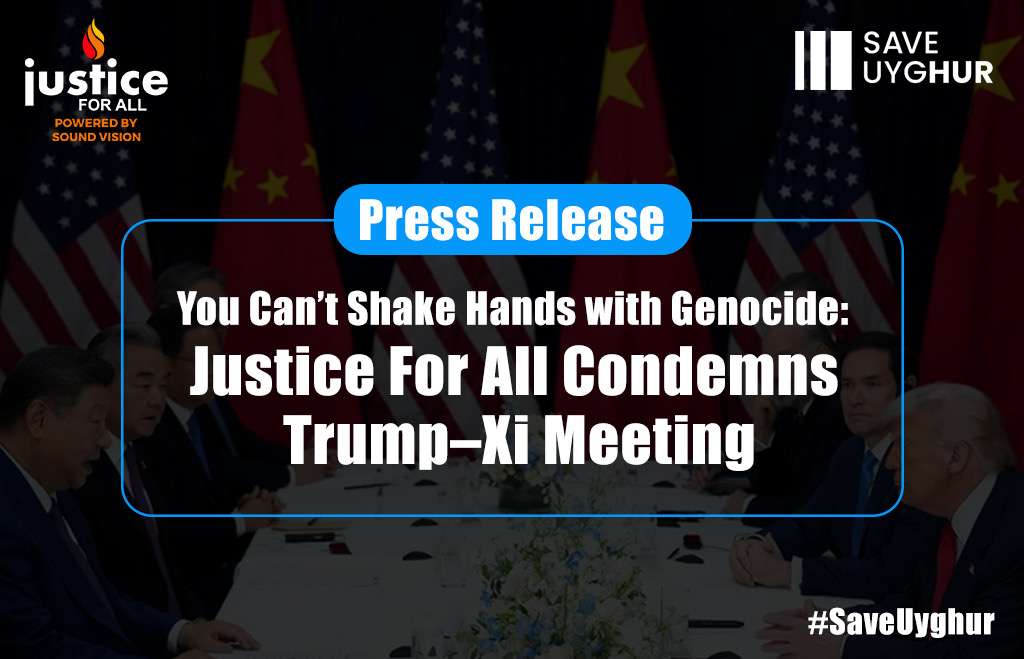FOR IMMEDIATE RELEASE Nov 20, 2025 Justice For All’s Save Uyghur Campaign is deeply concerned…
Save Uyghur Welcomes Senator Menendez’s Letter To Stop Forced Labor
Senator Bob Menendez (D-N.J.), Ranking Member of the Senate Foreign Relations Committee, sent a letter to Secretary of Commerce Wilbur Ross calling on his department to prevent American companies and consumers from buying goods produced by forced labor in East Turkestan. A more comprehensive list of companies complicit in forced labor can be found in ASPI’s recent report, “Uyghurs For Sale“. Companies include Nike, Adidas, Zara, H&M, Amazon, Dell, and many more.
“The use of materials that are manufactured using forced labor is unacceptable for products in U.S. markets,” wrote Senator Menendez.“Americans would be outraged to learn that products they purchase and use or clothes they wear are tainted by the severe human rights abuses being perpetrated by the Chinese government against Uyghurs and other Turkic Muslims in Xinjiang.”
A copy of the Senator’s letter can be found HERE and below.
Dear Secretary Ross,
I write today regarding the potential use of forced labor for goods and services sourced from Xinjiang by United States companies, ranging from computer terminals and other high tech goods to cotton used in the manufacturing of United States public service uniforms.
Since 2014, the Chinese government has engaged in a systematic repression campaign against the 13,000,000 Turkic Muslims in Xinjiang. Ostensibly aimed at fighting terrorism and separatism, the Chinese Communist Party (CCP) has instituted an Orwellian system of surveillance, intimidation, and mass internment of Uyghurs, ethnic Kazakhs, Kyrgyz, and members of other Muslim minority groups in Xinjiang. Credible reports suggest that more than 1,000,000 Uyghurs and other Turkic Muslims have been arbitrarily detained and forced into “political re-education” camps, where they are denied civil and political rights, such as the freedoms of expression, religion, movement, and a fair trial. Mounting evidence points to gross human rights violations occurring within these camps, including forced political indoctrination, torture, beatings, food deprivations, and other egregious abuses. Additionally, the CCP has forced many Uyghurs and other Turkic Muslims into labor at nearby factories, either while in detention or after release under threat of being sent back into the camps.
Recent reports have indicated that a wide array of U.S. companies, including Apple, Kraft Heinz, Coca-Cola, and the Gap, among others, have sourced or continue to source from Xinjiang. Other international firms with considerable U.S. presence also have operations in Xinjiang, including those who have partnerships with state-owned military contractors that manufacture and supply the Chinese government with the mass surveillance tools it uses in its new digital authoritarianism and other tactics of repression.
Moreover, there are consistent reports that U.S. companies fail to undertake basic labor and human rights assessments in Xinjiang, in essence willfully ignoring the horrific conditions of forced labor in Xinjiang. This is a particular problem for clothing and garment manufactures, given that 84% of Chinese cotton comes from Xinjiang. In failing to uphold their responsibilities to vet their supply chains these companies may be complicit in the mass repression of Uyghurs, ethnic Kazakhs, Kyrgyz, and members of other Muslim minority groups. They also may be compromising the supply chains of other global clothing companies who may have indirect links to goods manufactured in Xinjiang.
I appreciate the initial steps that the administration has taken to make designations and to address the situation in Xinjiang. But given the ongoing threat that the sourcing of goods and services produced by forced labor from Xinjiang poses to global supply chains, I urge the Department of Commerce to immediately establish clear and transparent standards of procurement and requirements for additional labor and human rights vetting for any goods or services that are manufactured in Xinjiang.
In addition, I would request information on any U.S. Government contractors who currently source cotton from China and whether or not this cotton is used in the manufacture of any United States public service uniforms.
The use of materials that are manufactured using forced labor is unacceptable for products in U.S. markets. Americans would be outraged to learn that products they purchase and use or clothes they wear are tainted by the severe human rights abuses being perpetrated by the Chinese government against Uyghurs and other Turkic Muslims in Xinjiang.
I look forward to working with you on this timely and important issue.
Sincerely,
The Save Uyghur campaign welcomes such letter, and calls on all other Senators to do the same.



